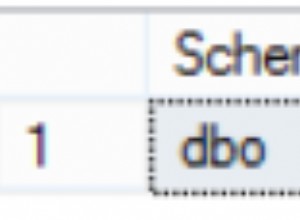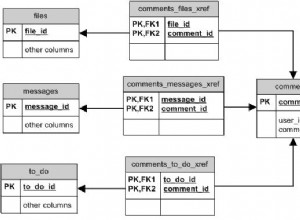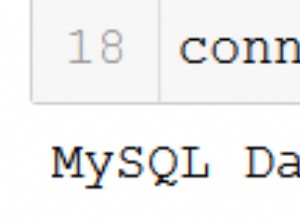Si usa EF 4.1 y superior, cambie "ObjectParameter" a "SqlParameter" y "ExecuteFunction" a "ExecuteStoreQuery" en su archivo Context.cs.
El método "ExecuteStoreQuery" también espera que agregue los nombres de los parámetros delante del proceso almacenado. Encuentre un fragmento a continuación:
var param1Parameter = param1 != null ?
new SqlParameter("param1", param1) :
new SqlParameter("param1", typeof(string));
var param2Parameter = param2 != null ?
new SqlParameter("param2", param2) :
new SqlParameter("param2", typeof(int));
return ((IObjectContextAdapter)this).ObjectContext.ExecuteStoreQuery<sp_TestSproc_Result>("sp_TestSproc @param1, @param2", param1Parameter, param2Parameter);
Si usa una plantilla para generar su código, también puede encontrar útil el fragmento a continuación. Es decir. Modifiqué el generador estándar "Fluent TT" para adaptarlo a EF 4.3:
void WriteFunctionImport(EdmFunction edmFunction, bool includeMergeOption)
{
var parameters = FunctionImportParameter.Create(edmFunction.Parameters, Code, EFTools);
var paramList = String.Join(", ", parameters.Select(p => p.FunctionParameterType + " " + p.FunctionParameterName).ToArray());
var returnType = edmFunction.ReturnParameter == null ? null : EFTools.GetElementType(edmFunction.ReturnParameter.TypeUsage);
var processedReturn = returnType == null ? "int" : "ObjectResult<" + MultiSchemaEscape(returnType) + ">";
if (includeMergeOption)
{
paramList = Code.StringAfter(paramList, ", ") + "MergeOption mergeOption";
}
#>
<#=AccessibilityAndVirtual(Accessibility.ForMethod(edmFunction))#> <#=processedReturn#> <#=Code.Escape(edmFunction)#>(<#=paramList#>)
{
<#+
if(returnType != null && (returnType.EdmType.BuiltInTypeKind == BuiltInTypeKind.EntityType ||
returnType.EdmType.BuiltInTypeKind == BuiltInTypeKind.ComplexType))
{
#>
((IObjectContextAdapter)this).ObjectContext.MetadataWorkspace.LoadFromAssembly(typeof(<#=MultiSchemaEscape(returnType)#>).Assembly);
<#+
}
foreach (var parameter in parameters.Where(p => p.NeedsLocalVariable))
{
var isNotNull = parameter.IsNullableOfT ? parameter.FunctionParameterName + ".HasValue" : parameter.FunctionParameterName + " != null";
var notNullInit = "new SqlParameter(\"" + parameter.EsqlParameterName + "\", " + parameter.FunctionParameterName + ")";
var nullInit = "new SqlParameter(\"" + parameter.EsqlParameterName + "\", typeof(" + parameter.RawClrTypeName + "))";
#>
var <#=parameter.LocalVariableName#> = <#=isNotNull#> ?
<#=notNullInit#> :
<#=nullInit#>;
<#+
}
var genericArg = returnType == null ? "" : "<" + MultiSchemaEscape(returnType) + ">";
var callParams = Code.StringBefore(", ", String.Join(", ", parameters.Select(p => p.ExecuteParameterName).ToArray()));
var spParams = Code.StringBefore("@", String.Join(", @", parameters.Select(p => p.EsqlParameterName).ToArray()));
if (includeMergeOption)
{
callParams = ", mergeOption" + callParams;
}
#>
return ((IObjectContextAdapter)this).ObjectContext.ExecuteStoreQuery<#=genericArg#>("<#=edmFunction.Name#> <#=spParams#>"
<#=callParams#>);
}
<#+
if(!includeMergeOption && returnType != null && returnType.EdmType.BuiltInTypeKind == BuiltInTypeKind.EntityType)
{
WriteFunctionImport(edmFunction, true);
}
}




